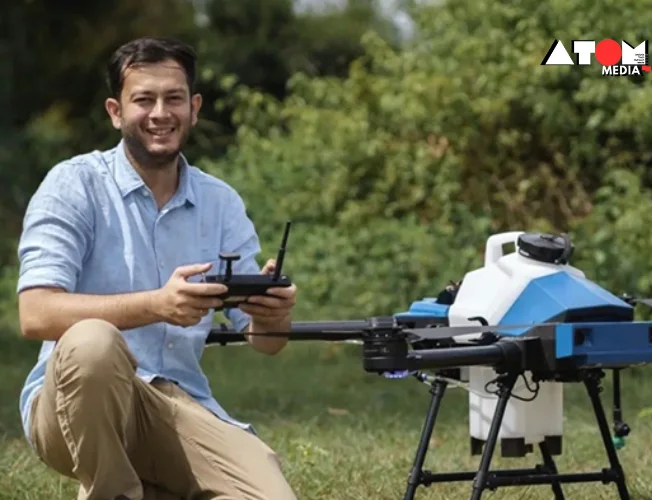In Maharashtra’s lush banana plantations, a farmer gazes as a drone hovers above his crops, scanning for early signs of disease with sensors capable of detecting threats invisible to the human eye. This is not just an agricultural drone; it’s a sophisticated tool in the arsenal of Suind, an Indo-Swiss agritech startup. Suind’s AI-powered autonomous drones and advanced analytics are driving a sustainable shift in agriculture, helping farmers reduce chemical use, cut costs, and increase yields.
A New Vision for Agriculture
Suind, founded in the research labs of ETH Zurich by computer vision and AI experts Kunal Shrivastava and Kevin Kleber, is on a mission to address the technology gap in agriculture. “Agriculture often lags in tech adoption, and we wanted to change that,” Shrivastava explains. Their drones, designed specifically for crop protection, are transforming traditional farming by tackling challenges such as pest control, disease prevention, and resource management with unmatched precision.
Innovative Technology Driving Efficiency
What makes Suind’s drones unique is their advanced computer vision-based autonomy. Rather than relying on heavy and costly LiDAR, the drones use a lightweight camera system that captures over 12 million data points per second. This approach has resulted in the lightest agricultural drones in their category, equipped with essential features like obstacle avoidance, precision terrain following, and dynamic battery management.
These drones, designed to reduce chemical usage by up to 60% and water usage by over 90%, also lower operational costs by 50%. The lightweight build and intelligent systems allow for agile navigation, even in difficult terrain, while advanced spray monitoring ensures optimal resource use. “Small features like auto-return when the tank empties or adjusting spray rates based on crop health make a big operational difference,” says Shrivastava.
Beyond Spraying: Data-Driven Crop Protection
The heart of Suind’s innovation lies in its comprehensive crop protection suite. Drones equipped with multispectral sensors create high-resolution 3D maps of farms, distinguishing between crop and soil data to provide actionable insights through machine learning algorithms. These analytics help farm managers make informed decisions and support sustainable practices, such as tracking green cover to qualify for carbon credits.
Integrating data from sources like weather stations and soil sensors, Suind’s system facilitates the creation of prescription maps, further refining spray accuracy and minimizing chemical use. This precision-focused approach not only preserves the soil microbiome but also safeguards the environment by reducing soil acidification. “By adjusting the spray rate to meet varying dosage needs across the field, we’re ensuring the soil remains healthy for future generations,” Shrivastava adds.
Empowering Farmers with Accessible Technology
Understanding that farmers are often hesitant to adopt new technologies, Suind has developed a drone-as-a-service model to reduce upfront costs. They also encourage a split-field approach, where a farm can trial the system on one section while maintaining traditional methods on another. Suind is working alongside government agricultural institutes to develop standardized protocols that make these technologies more accessible and user-friendly.
Shrivastava underscores the importance of this gradual introduction: “Farmers are entrepreneurs at heart. Once they see the technology’s impact within a single harvest cycle, they gain the confidence to invest in it.” This pragmatic approach allows farmers to witness firsthand the value of AI-powered crop protection and data-driven insights.
The Swiss Connection: Global Support for a Local Impact
Suind’s journey has been bolstered by Swissnex, an organization that helps connect Swiss innovations with global opportunities. Swissnex’s support has provided Suind with valuable insights into local markets and business networks, a key advantage as the company prepares for its official market launch in early 2025. The support from Swissnex was particularly valuable during their seed funding round, which raised Rs 5 crore.
“Having a partner like Swissnex helps immensely,” Shrivastava shares. “As a founder, being able to discuss challenges and get insights makes all the difference.”
A Sustainable Future for Farming
With climate change pressures and shrinking arable land, Suind’s technology exemplifies the future of agriculture—where precision and sustainability converge. By reducing chemical inputs, conserving water, and supporting a healthier soil ecosystem, Suind is setting a new standard in crop protection. Shrivastava envisions a future where “the ‘Suind method’ becomes as integral to crop management as GPS is to navigation.”
Back in Maharashtra’s fields, where banana farmers see their yields rise and costs drop, it’s clear that Suind’s revolutionary approach to crop protection is not just taking off—it’s already making an impact. As more farmers adopt Suind’s technology, agriculture stands on the brink of a transformation that promises to balance productivity with environmental stewardship.
Read more: Marketing News, Advertising News, PR and Finance News, Digital News





